- Photo
feature tells about Kangra Queen Toy Train that starts from Pathankot in Punjab
and ends at Jogindernagar in Himachal. It includes history, stations, scenery,
time taken, touristy places and temples close to stations. Lastly, how to
reach.
This
is the third article in our Kangra series, the first being Masrur Rock-cut
Temples and second was Jawala Ji Mandir.
A lot is written about the Toy Trains to Simla, Darjeeling and Ooty but not much is known about the one to Kangra.
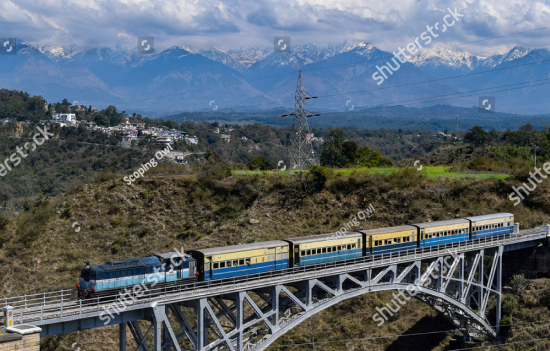
Background and History
The Kangra Valley Railway lies in the sub-Himalayan
region of Kangra Valley. It covers a distance of 164 km from Pathankot, Punjab to
Jogindernagar in Himachal Pradesh and comes under Northern Railways.
The highest point on this line is at Ahju station at an elevation of 4,230
feet.
The railway line was planned in May 1926 and commissioned in 1929. The
line has two tunnels, one of which is 250 feet in length and the other being 1,000
feet. Trains on this narrow gauge line (track is only two and a half feet wide)
are pulled by small and less powerful engines than on a broad gauge line. But
instead of expensively boring through the mountains on a straight way, a much
longer right-of-way further south was chosen that allowed ascent over gentle
slopes.
From 1942 to 1954 there was no train service east of
Nagrota (near Kangra). When the Maharana Pratap Sagar (known as Pong Dam) was
constructed, the line had to be diverted between Jawanwala Shahr and Guler into
higher grounds along the eastern shore of the new reservoir. In 1973, the
section between these two stations, along with Anur, Jagatpur and Mangwal
stations was abandoned, and the new alignment with several new stations opened
three years later.
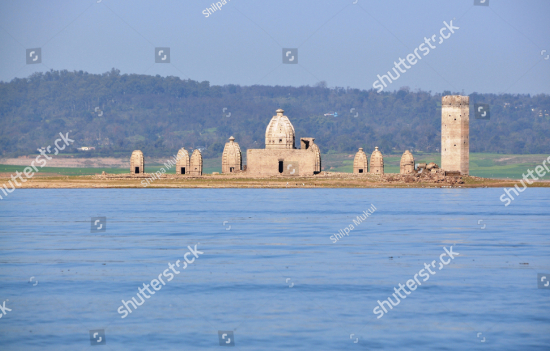 Bathu-ki-ladi Temples that were submerged to make Pong Dam.
Bathu-ki-ladi Temples that were submerged to make Pong Dam.
Frequency
Six trains run daily from Pathankot of which two are up to
Jogindernagar and four up to Baijnath Paprola. The train covers 33 stations.
Unlike the Shimla-Kalka railway toy train, which spends the majority of
its time travelling through tunnels, the Kangra one slowly meanders through a
network of hills and valleys, providing passengers with beautiful views.
The train is primarily used by locals. It is usually not crowded. Advance
booking is not possible although train timings can be found out. During season
sometimes the trains run full. Then, depending even though you may have a
ticket there is no guarantee of getting space to stand, let alone sit.
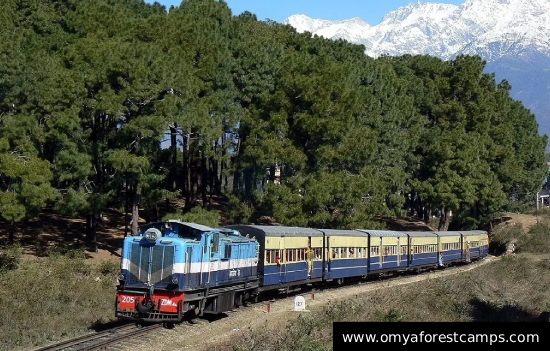

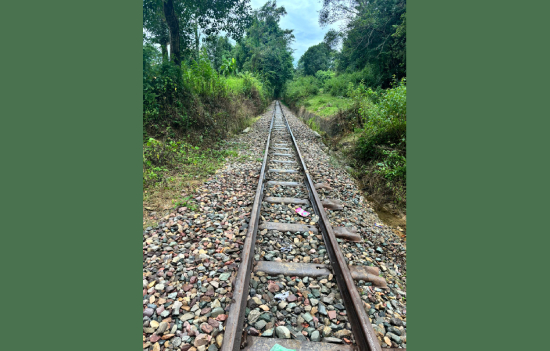 Railway track 2.5 feet wide. So green.
Railway track 2.5 feet wide. So green.
Journey and Time taken
There are six bogies in the slow chugging train, with
every coach having a 37 people seating capacity. The seats are comfortable and
the windows-bare and open, affording unhindered views.
It has 971 bridges and two tunnels along the
track, making it one of the most scenic narrow-gauge journeys in India.
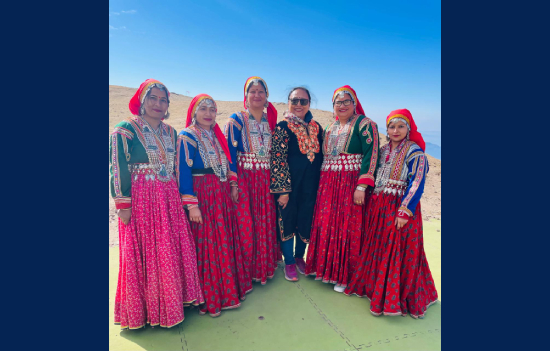 If lucky you might meet local women near Palanpur.
If lucky you might meet local women near Palanpur.
The Kangra Valley is always visible as the train moves over bridges, Beas river crossings, streams and lush green valleys. The expansive, snow-covered Dhauladhar hills provide panoramic views. Passengers can learn about the region's natural beauty and history as the train also travels by tea gardens and the ruins of the Kangra Fort.
We pass through thick forests as the train nears Nagrota.
The train continues to wind its way and ascend to the tea garden town of
Palampur. On sharp bends just before
Palampur, it sometimes appears as if the train is headed straight for the snows
only to change direction and keep following the foothills.
The travel time for entire journey i.e. Pathankot to Joginernagar (164
kms) takes 9-10 hours. The time from Pathankot to
Kangra Mandir is app 4 hours. One can cover by taxi or auto too.
Stations
The major stations enroute are Jawalamukhi
Road, Kangra, Nagrota, Palampur, and Baijnath Paprola. Kangra Mandir
station is before Jogindernagar.
The train does not stop directly at Dharamshala, as the town does not have a railway station. The nearest stations are Kangra Mandir (approx. 20 km) and Nagrota Bagwan (approx. 17 km). Dharamshala is connected from these stations by road (30–40 minute drive).
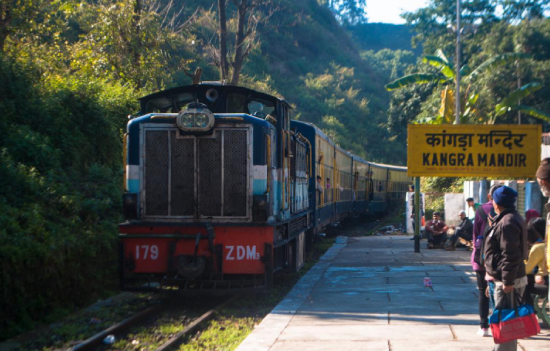
Destinations close to Railway stations enroute-
1. Kangra Mandir is 2 kms
from Kangra Mandir station.
2. Chamunda Devi Mandir is 8 kms from Palampur Himachal station.
3. Dharamshala is 17 kms from
Kangra station.
4. Jawaladevi Mandir is 21 kms from Jawalamukhi Road station.
5. Abode of Dalai Lama Mcleodganj is 27 kms from Kangra station.
6. Chintapurni Devi Mandir is 36 kms from Jawalamukhi Road station.
7. Baijnath Temple – get off at Baijnath Paprola station. Temple 2 kms away.

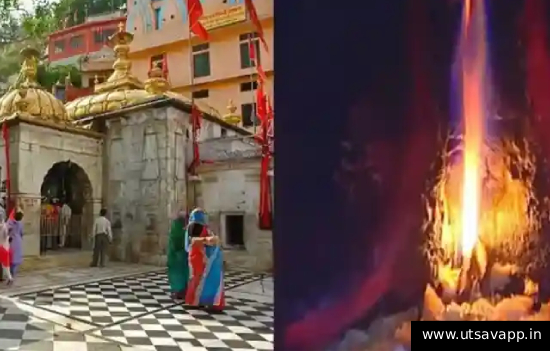 Jawaladevi Mandir is a Shaktipeet.
Jawaladevi Mandir is a Shaktipeet.
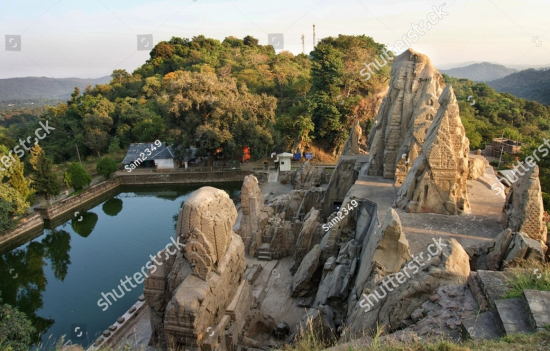 17 kms from Dharamshala are Masrur Rock-cut temples.
17 kms from Dharamshala are Masrur Rock-cut temples.
How to reach Pathankot
Since the toy train starts at Pathankot, a bit about this Punjab city. If
you take Jammu Tawi express, the stations are Pathankot, Kathua, Samba and
Jammu. Pathankot is before Kathua (distance 43 kms). If you driving from
Amritsar to Jammu take a digression for Pathankot
If you going to or returning from Vaishnudevi, travel to Pathankot (distance
from Jammu to Pathankot is app 106 kms) and take the toy train. It is a journey
to remember. You can get off at Kangra station and spend two days travelling
around revered temples and Kangra Fort close by or do the train journey in a
day. If you stay at Kangra, there are overnight buses from Dharamshala to
Manali.
Now sharing some more pictures.
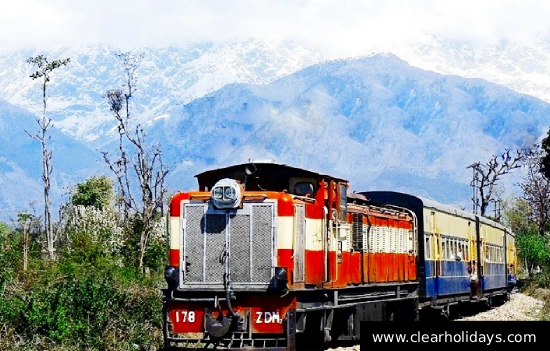 Enroute.
Enroute.
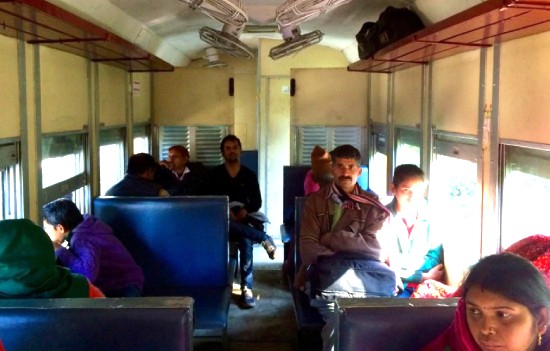
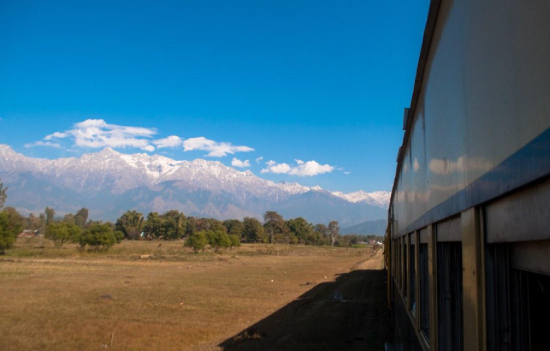 Dhauladhar range of the Himalayas are visible in the far distance.
Dhauladhar range of the Himalayas are visible in the far distance.
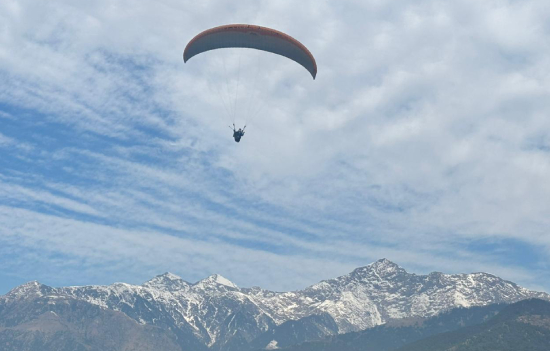 Para gliding in Kangra Valley.
Para gliding in Kangra Valley.
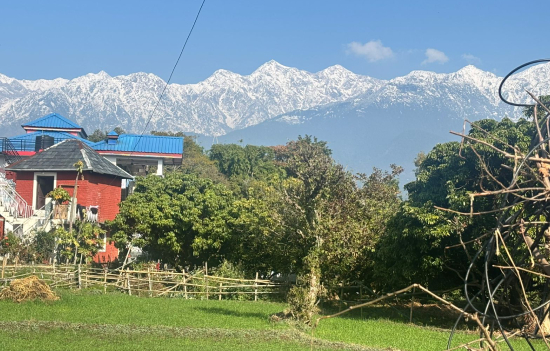 Local home in Kangra Valley.
Local home in Kangra Valley.
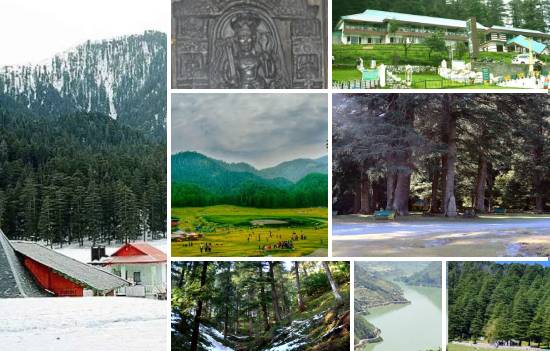 Khajjiar near Dharamshala is the mini-Switzerland of India.
Khajjiar near Dharamshala is the mini-Switzerland of India.
The 1929 Kangra Valley Railway
is in the tentative list of UNESCO world heritage sites. More tourists need to
enjoy this train journey.
To read all
articles by author and To see all albums
on Himachal
To see only albums
1. Kangra Valley and
2. Dharamshala
Travelogues Himachal
1. The Best of Spiti
Valley and Kinnaur in 15 days
2. Khajjiar
near Dharamshala is the mini-Switzerland of India.
3. Ten Off Beat
places in Himachal Pradesh
4. Masrur Rock-cut
temples in Kangra
Author - Vikas Sharma-Jugadu Engineer: From Ideas to Impactful Solutions,
Amplified by Voice Jugadu Engineer was
born from a singular vision: to transform abstract engineering concepts into
tangible, real-world impact. What began as a humble idea has rapidly blossomed
into a trusted partner for start-ups
and NGOs seeking not just solutions, but genuinely impactful
results.
Check his U Tube Channel.
Visit his website
eSamskriti is grateful to
travellers/bloggers whose temple photos it has used to showcase Masrur Temples.
Credits given as well.